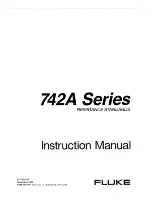
8
Instruction Booklet
IB02201004E
Effective October 2017
Revision #4
Instructions for installation, operation, and
maintenance of 38 kV type VacClad-W,
150 BIL switchgear indoor housings
EATON
www.eaton.com
Figure 4. Main Bus Installation – Barriers Removed Showing the
Main Bus Connections.
Figure 5. Main Bus Installation – Barriers Removed Showing the
Bus Joing Insulating Boots.
Step 6: Connect the control wires .
A . Reconnect the wiring that was disconnected at the factory
for shipping . The wiring, as well as the connecting points, is
labeled .
B . Connect the wiring to the remote apparatus and to the terminal
blocks located in the control compartment or within the front of
the vertical section .
Step 7: Replace the angled metal barriers, vertical main bus barriers,
and any other parts that may have been removed to gain
access to the main bus compartments .
Step 8: Connect the main power cables .
A . Before connecting a cable, determine its phase . The switchgear
system is supplied with connections for phasing 1-2-3, left to
right (viewed from the front), unless indicated otherwise on the
shop order drawings .
Splice Plate Join
Main Bus
Bus Boot
Placement
B . If the two systems are to be paralleled, make sure the phase
rotation and the phase angles are the same . They must be the
same to prevent damaging the equipment . The phase rotation
must conform to the phase rotation on the shop order drawing
so that the instruments, meters, and relays will operate properly .
C . When forming cables to fit inside the cable compartment, avoid
sharp bending or kinking . Make sure the cables do not rest on
sharp corners or edges that could damage the insulation .
D . Follow the instructions of the cable manufacturer to determine
what minimum bending radius is permitted . Follow the instruc-
tions on insulating the joints so the insulation will taper properly
through the correct gradient . The insulation will vary with the
type and size of cable, and with the service voltage for which it
was designed .
E . Solderless connectors are usually furnished . The connection
must be insulated according to the recommendation of the cable
manufacturer .
F . If potheads or other types of terminators are furnished, follow
the manufacturer’s instructions when connecting the cables to
them . Use the flexible connectors to connect the arial lugs to
the conductors . This will keep strain off the insulators of the
pothead or the terminator . Tape (or otherwise insulate) the
entire joint, including the flexible connectors (see the Metal-clad
switchgear field taping procedure [38 kV] section in this manual) .
G . If zero sequence transformers are used, pass the power cables
through the transformer (refer to Figure 35) .
H . Replace all metal barriers and any other components removed
during hookup of the high voltage bus . Replace them in the
reverse order from which they were removed .
I . Replace all rear covers or close doors .
Step 9: Check the operation of the levering in system in each of the
breaker compartments . Refer to the breaker Instructional
Booklet, IB3A74792, for additional details on manual and
electrical operation checks of the breaker .
A . Push the breaker into the breaker compartment until the breaker
lift/pull handle latches over the moving block on the racking
screw . Channels are provided on the floor sheet to assist in
the alignment of the breaker wheels as it is moved into the
compartment . In this position, the breaker is considered in the
Disconnect position .
B . In order to place the breaker in the Test position mode, you must
pull the secondary plug handle forward until the secondary plug,
located on the compartment levering pan, fully mates with the
breaker secondary plug . In this position, the breaker compart-
ment control circuit can be tested offline (breaker is not con-
nected to the primary circuit) .
C . Movement of the breaker from the Disconnect or Test position to
the Connect position:
1 . Before the breaker can be moved from the Disconnect or
Test position to the Connect position, the breaker must be
open .
2 . Insert the levering crank onto the hex drive nut on the racking
screw . In order to engage the hex drive nut, you must push
a safety slider in and out of the way of the hex nut .
otee:
N
If the breaker is closed, you will not be able to push the safety slider in
to engage the hex drive nut . You must trip the breaker by means of either the
Open pushbutton on the front of the breaker or electrically using the control
circuit .
3 . Rotate the levering crank in a clockwise direction until the
torque limiter on the levering crank “breaks” free . As a
check, the red indicator on the levering system can be seen
through the window on the front of the levering system .









































